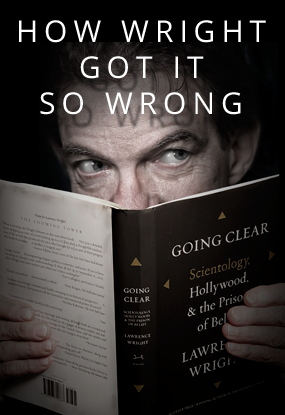A Correction of the Falsehoods in Lawrence Wright's Book on Scientology
Write claims, “England banned foreign Scientologists from entering the country for study in July 1968 and declared Hubbard an undesirable alien.
”>> True Information: Wright omits that this immigration ban was repealed in July 1980. The 1980 revocation by the government was caused by the realization that no lawful justification had ever existed for the measure.
For decades the documents evidencing this shocking repression of religious freedom were kept from public view by the U.K. Official Secrets Act, but were made available to the Church in 2005 under the UK Public Records Act.
These documents contain shocking revelations of prejudice and covert hostility that led to behind-the-scenes machinations to create smear campaigns against the Church and deny Scientologists their fundamental rights.
The documents show that the generalized “concerns” publicly voiced by the government to justify its restrictions over the 12-year period 1968 to 1980 were not worth the paper they were printed on. The Home Office and the Ministry of Health knew they had no evidence to support the measure, but they knowingly manipulated the press and the public to create an atmosphere to permit them to institute the oppressive decree.
The documents reveal beyond a shadow of a doubt that the generalized “concerns” used to justify the restrictions were not only baseless, they also contain blatant admissions that these “concerns” were manufactured.
The government’s actions were couched in words that reveal the bias of the highest officials, such as intentional actions to “inspire some more adverse publicity” or “get as much publicity as possible … condemning Scientology.”
No attempt was made to justify discriminatory actions; instead, issues relating to Scientology were characterized as “highly political, and, by Government decision, every effort is made to discourage” the religion. One official prophetically noted that “the Home Office evidently intends to keep up the campaign of harassment indefinitely.”
Another official conceded the popularity of the Scientology movement: “No amount of criticism or ridicule will stamp out Scientology. Nothing short of legislation making it illegal will do this.” This is not the language of fair, impartial government.
According to the documents, the impetus for the harassment campaign against Scientologists came from then-Health Minister Kenneth Robinson, who harbored a “strong personal dislike of Scientology” and “felt great anxiety” about the subject—a bias that could not be hidden by even the façade of objectivity.
Factually, not one documented crime was ever disclosed—the entire charade was fuelled by rumor, suspicion and innuendo. To quote from just a few of the documents:
“Scientologists do not appear to be committing any criminal offence.”
“We cannot find that these people are committing any criminal offence.”
“The information in the possession of the Police is really second-hand and therefore of doubtful evidential value.”
“It will be seen, therefore, that in all three cases any information coming into the possession of the Police was mere hearsay evidence, and would be of very little value ….”
Six months after the UK Scientology immigration restrictions went into effect, the new Secretary of State for Social Services, Richard Crossman, appointed Sir John Foster to conduct an Inquiry into Scientology. Foster completed his report in April 1971. In its introduction, he wrote: “For the reasons set out in detail in Chapter 8 of this Report, I have come to the conclusion that most of the Government measures of July 1968 were not justified.” [Introduction to “Enquiry into the Practice and Effects of Scientology,” Report by Sir John Foster, K.B.E., Q.C., M.P., Published by Her Majesty’s Stationery Office, London, December 1971.
Foster stated in later years that “it was a lot of rigged-up nonsense full of lies and seemed to involve pathological personal dislike of Scientology on the part of some involved.”
The day following the presentation of the Foster Report to Parliament, Richard Crossman (then no longer a government official), stated on BBC Radio 4:
“I personally very much regretted it [the Scientology immigration measure] had been done without a really thorough investigation … and so I felt it was absolutely essential the penalties having been imposed in this way [that] I must have the thing cleared up … I thought the Scientologists had a legitimate complaint. They had been singled out.” (BBC Radio 4—December 22, 1971)
Even so, the government refused to adopt the recommendation. It was not until 1979, following a Parliamentary Motion signed by no fewer than 77 Members of the House of Commons, entitled “Justice for Scientologists,” that the measure was reviewed in earnest and revoked in the following year.
Leslie Chapman, advisor to the Prime Minister, described why the Thatcher government canceled the edict in 1980: “I had come to the conclusion that it was all unfounded gossip rooted in ignorance, prejudice, spite and malice in roughly equal proportions.” And the new Home Secretary William Whitelaw acknowledged that there had been no clear and sufficient evidence to justify what had been done to unfairly and illegally curb the rights and freedoms of Scientologists in England.
